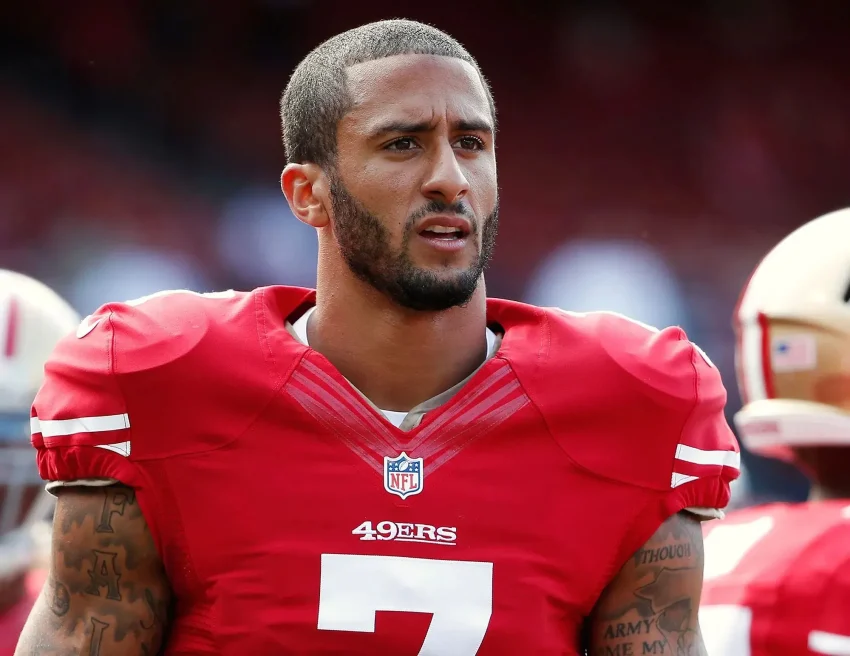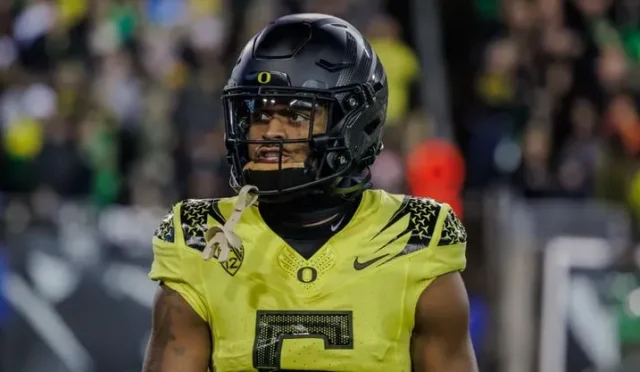Colin Kaepernick, born on November 3, 1987, in Milwaukee, is not just a former American football quarterback renowned for his time with the San Francisco 49ers; he has become a symbol of activism in contemporary sports. His NFL career, marked by a memorable Super Bowl appearance and standout performances, took an unexpected turn when he started to openly protest racial injustice and police brutality. Kaepernick’s decision to kneel during the national anthem ignited a nationwide conversation that highlighted issues of inequality and sparked widespread protests. His actions, rooted in a deeply personal conviction, led to both acclaim and criticism, making him a polarizing figure in sports and society alike. As we delve deeper into Colin Kaepernick’s biography, we explore how he transformed his athletic platform into a powerful voice for social change.
The story of this former football star transcends the realm of athletics, positioning him as a pivotal figure in the fight for social justice. Kaepernick’s decision to engage in activism has resonated beyond the football field, making him a household name synonymous with courage and controversy. His protests have encouraged a new dialogue regarding civil rights and have amplified the conversations around systemic oppression in America. With the backdrop of his impressive achievements in the NFL, including notable playoff runs and a Super Bowl matchup, Kaepernick’s journey reflects the intersection of sports and activism in today’s society. As we examine the influence of Kaepernick and the legacy of his actions, we uncover a narrative that challenges the status quo and inspires future generations.
Colin Kaepernick’s NFL Career Journey
Colin Kaepernick’s NFL career began with the San Francisco 49ers, where he quickly made a name for himself as a dual-threat quarterback. His journey in the NFL started in the 2011 NFL Draft when he was selected in the second round. Kaepernick’s athletic prowess was evident from the beginning; he displayed extraordinary passing and rushing abilities that allowed him to excel in high-pressure situations. His breakout performance came in the 2012 season when he led the 49ers to the Super Bowl, showcasing his talent and leadership on the field. Despite a heartbreaking loss to the Baltimore Ravens, Kaepernick’s performance solidified his place in NFL history and made him a fan favorite until the end of his tenure with the 49ers in 2016.
Throughout his NFL career, Kaepernick demonstrated resilience and adaptability, adapting his playstyle to fit the team’s needs. In the subsequent season, he helped the 49ers achieve a 12-4 record, emphasizing his effectiveness as a starter. However, changes within the team and injuries led to a decline in performance, causing tensions between him and the coaching staff. Ultimately, Kaepernick’s time in the league was marked not only by his on-field accomplishments, including his impressive Super Bowl run, but also by the controversial protests he initiated, putting a spotlight on social issues affecting African Americans.
The Impact of Colin Kaepernick’s Activism
Colin Kaepernick emerged as a prominent figure in social activism, particularly during the 2016 NFL season when he chose to kneel during the national anthem. This act was a powerful protest against racial injustice and police brutality, igniting a nationwide discussion about inequality and oppression. Kaepernick’s actions received both praise and criticism, showcasing a divide in public opinion on the right to protest. His commitment to raising awareness eventually led to a larger movement within the NFL and beyond, inspiring many athletes to use their platforms for social change.
The ramifications of Kaepernick’s activism extended beyond the football field. His efforts catalyzed dialogues surrounding race relations in America, influencing public perceptions of the NFL and demanding accountability from its leadership. NFL Commissioner Roger Goodell’s acknowledgment of Kaepernick’s message following the renewed emphasis on social justice in 2020 marked a significant moment of reconciliation between the league and players advocating for change. Kaepernick’s activism rendered him a symbol of the fight against systemic racism, earning him accolades like the Muhammad Ali Legacy Award, and reinforcing the importance of speaking out against injustice.
Colin Kaepernick’s Legacy in Sports and Activism
Colin Kaepernick’s legacy transcends his achievements as an NFL quarterback; it encompasses his role as a pivotal voice in the movement for social justice. Despite not playing in the NFL since 2016, Kaepernick’s influence continues to resonate deeply within the sports community and far beyond. His willingness to face backlash and adversity in pursuit of equality has inspired countless athletes and activists to take a stand, underscoring the profound intersection of sports and social consciousness in contemporary society.
As we reflect on Kaepernick’s journey, it becomes evident that his legacy is defined not merely by his athletic prowess or his Super Bowl appearance but by his unyielding advocacy for marginalized communities. The partnership he formed with Disney in 2020 to create socially conscious content further illustrates his commitment to fostering dialogue on important issues. Kaepernick’s enduring impact serves as a reminder of the power athletes possess to enact change, challenge societal norms, and advocate for justice.
Colin Kaepernick and the National Anthem Protests
The national anthem protests led by Colin Kaepernick during the 2016 NFL preseason marked a turning point in the relationship between sports and political activism. When Kaepernick first decided to sit and later kneel during the anthem, his intentions were rooted in addressing systemic racism and the injustices facing African Americans. This courageous act not only sparked a national conversation but also prompted other athletes across various sports to join the movement, illustrating a widespread desire for social change and advocacy against oppression.
Kaepernick’s decision to protest drew mixed reactions, with many supporters praising his bravery while critics accused him of being unpatriotic. Nevertheless, the dialogue his protest created was invaluable. It encouraged discussions about racial injustice, police brutality, and the experiences of marginalized communities in the United States. The consequences of Kaepernick’s activism continue to be felt, as it has influenced how athletes interact with social issues moving forward, leading to ongoing initiatives and awareness campaigns in the sports landscape.
The Evolution of Colin Kaepernick’s Influence
Colin Kaepernick’s influence has evolved since his days as a standout quarterback with the San Francisco 49ers. Initially celebrated for his athletic accomplishments, his legacy has significantly shifted to focus on his activism. The connection between his sports career and his commitment to social justice is undeniably strong, as his platforms in both realms have allowed him to advocate for critical social issues facing the African American community. Kaepernick’s ability to use his sports fame for activism has set a precedent for future generations of athletes.
In recent years, Kaepernick’s role has expanded beyond football; he has become a leading figure in movements advocating for equality and justice. His collaborations with various organizations and public figures demonstrate his dedication to these causes, further strengthening his impact. As the dialogue around race and inequality in America continues to evolve, Kaepernick remains a pivotal figure whose influence encourages dialogue and action across various sectors, including sports, entertainment, and beyond.
Colin Kaepernick: From Player to Influencer
Transitioning from an NFL player to a prominent social activist, Colin Kaepernick exemplifies how athletes can become powerful influencers beyond their professional careers. After his time with the 49ers, Kaepernick did not disappear from the public eye; instead, he embraced a new role as a champion for social justice. Through various initiatives aimed at addressing systemic issues, Kaepernick has leveraged his platform to inspire action and provoke thought about the injustices faced by marginalized communities.
The significance of Kaepernick’s transition illustrates a growing trend of athletes engaging with social and political issues. By stepping away from the field, he has been able to focus on activism and philanthropy, making meaningful contributions to communities in need. This shift in Kaepernick’s narrative inspires current and future athletes to utilize their visibility for advocacy, reinforcing the idea that sports figures can drive societal change while remaining true to their values.
Colin Kaepernick’s Cultural Impact
Colin Kaepernick’s cultural impact extends far beyond the NFL; it encompasses a broader societal movement geared towards addressing racial injustices. His decision to kneel during the national anthem sparked a cultural revolution, prompting athletes, celebrities, and ordinary citizens to engage in the dialogue about racial equality. Kaepernick’s stand for justice resonated with many, making him a symbol of resistance against systemic oppression, and his efforts have been influential in fostering solidarity across various communities.
As a result of his activism, Kaepernick has not only created awareness around social justice issues but has also influenced other related cultural movements, urging various sectors to confront their roles in perpetuating inequality. His legacy encourages individuals to challenge societal norms and take an active stance against injustice, illustrating how one person’s courage can ignite a larger movement. Today, Kaepernick’s impact can be felt in not just sports culture but in social movements advocating for change.
Recognitions and Awards for Colin Kaepernick
Colin Kaepernick’s commitment to activism has garnered significant recognition and numerous awards, showcasing his effort and dedication to social change. Among these accolades are the Muhammad Ali Legacy Award from Sports Illustrated and the Ambassador of Conscience Award from Amnesty International. These honors underline Kaepernick’s profound influence in promoting awareness around critical social issues, reinforcing his status as a hero in the fight for racial equality. The recognition serves as a testament to the power of advocating for what is right, even in the face of adversity.
Kaepernick’s achievements reflect not only his athletic prowess but also a deep-seated commitment to advocating for marginalized communities. His work continues to inspire many activists, encouraging them to embrace courage and resilience in the pursuit of justice. The recognition Kaepernick has received is emblematic of a broader shift in how societal contributions are valued, making it clear that sports and activism can coexist and fuel one another.
Colin Kaepernick’s Future and Impact
The future impact of Colin Kaepernick on sports and activism remains significant as he continues to push for social justice and equality. Although his NFL career has come to a standstill, his voice is more potent than ever. Kaepernick’s ongoing efforts in the realm of activism, especially in partnership with influential organizations, ensure that he will always play a vital role in the dialogue surrounding race and justice in America. The strides he has made not only pave the way for future athletes but also encourage everyone to reevaluate their responsibilities regarding social justice.
As Kaepernick forges ahead, his influence on the younger generation of activists and athletes will likely continue to grow. His ability to utilize sports as a platform for social change showcases the importance of commitment and courage. With each step he takes, Kaepernick reinforces that individual action can lead to widespread societal change, inspiring countless others to take up the mantle of advocacy for equity and justice.
Frequently Asked Questions
What is Colin Kaepernick known for in his NFL career?
Colin Kaepernick is well-known for his time as the quarterback for the San Francisco 49ers, where he led the team to a Super Bowl appearance in 2013. He gained recognition for his dynamic playing style and notable achievements, including being named the Western Athletic Conference Offensive Player of the Year in college. However, he is equally recognized for his activism and protests against racial injustice during his NFL career.
What were Colin Kaepernick’s main protests about?
Colin Kaepernick’s main protests focused on racial injustice and police brutality against African Americans. He began his activism during the 2016 preseason by kneeling during the national anthem to draw attention to these issues, stating he could not show pride in a flag that oppresses Black people.
Can you provide a brief biography of Colin Kaepernick?
Colin Kaepernick was born on November 3, 1987, in Milwaukee, Wisconsin. He was adopted and raised in Turlock, California, where he excelled as a multi-sport athlete. Kaepernick attended the University of Nevada, earning a football scholarship and eventually becoming the 49ers’ second-round draft pick in 2011. His NFL career was marked by significant moments, including leading his team to the Super Bowl in 2013, but he is also known for his activism and protests against social injustices.
What impact did Colin Kaepernick’s protests have on the NFL?
Colin Kaepernick’s protests had a profound impact on the NFL, igniting nationwide discussions about race relations and police brutality. His actions prompted responses from numerous players, leading to a wave of similar protests within the league. In June 2020, NFL Commissioner Roger Goodell acknowledged that the league should have listened to Kaepernick, reflecting a shift in the NFL’s approach to social justice issues.
What accolades has Colin Kaepernick received for his activism?
Colin Kaepernick has received several awards for his activism, including the Muhammad Ali Legacy Award from Sports Illustrated in 2017 and the Ambassador of Conscience Award from Amnesty International in 2018. These accolades highlight his significant contributions to social justice and raise awareness about racial inequality.
Did Colin Kaepernick return to the NFL after his activism?
After his activism, Colin Kaepernick became a free agent at the end of the 2016 NFL season, but he did not receive any offers from NFL teams and subsequently filed a grievance against team owners for collusion. He reached a settlement with the NFL in February 2019. Following a private workout in November 2019, he remained unsigned and has not returned to the league.
What was Colin Kaepernick’s performance like in the Super Bowl?
In the Super Bowl XLVII, Colin Kaepernick played a pivotal role for the San Francisco 49ers, highlighting his skills as a dual-threat quarterback. Although the team lost to the Baltimore Ravens, Kaepernick threw for over 300 yards and scored a rushing touchdown, showcasing his talent on the biggest stage in football.
| Aspect | Details |
|---|---|
| Birth | November 3, 1987, Milwaukee, Wisconsin, U.S. |
| Career Highlights | Quarterback for San Francisco 49ers (2011-2016); led team to Super Bowl in 2012. |
| Protests | Kneeled during national anthem to protest racial injustice and police brutality, starting in 2016. |
| Notable Recognitions | Muhammad Ali Legacy Award (2017), Ambassador of Conscience Award (2018). |
| Population Impact | His actions sparked national conversations on race, resulting in both support and criticism, including from political figures. |
| Hiatus from NFL | Remained out of the league after becoming a free agent in 2017, filing grievances for collusion against team owners. |
Summary
Colin Kaepernick is not only recognized for his athletic skills but also for his bold stance on social justice issues. His decision to kneel during the national anthem brought widespread attention to the issues of racial inequality and police violence, igniting a movement that resonates in contemporary discussions about civil rights. Through his activism, Kaepernick has become a symbol of resistance, inspiring many to stand against injustice and advocate for change.








